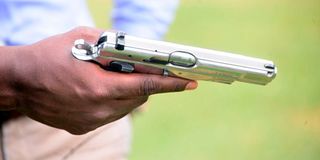Nairobi gangs getting fiercer by the day

On the streets of Nairobi, the gangs that target Kenyans on foot are malicious and ruthless.
What you need to know:
- Lately, the crime rates on the streets and roads of Nairobi have taken a turn for the worst.
- These streets gangs target anybody who appears to have something they can grab.
This piece is directly addressed to Nairobi Metropolitan Services (NMS) Director-General Mohammed Badi, Inspector General of Police Hillary Mutyambai and other heads of agencies tasked with security in the city of Nairobi.
We have always known that Nairobi, like other cities across the world such as New York and Cape Town, is bound to be crime-infested and – believe me – we have taken individual measures to protect ourselves. However, lately, the crime rates on the streets and roads of Nairobi have taken a turn for the worst.
It is not the frequency of crime that worries me; it is the utter audacity and reckless fashion in which these streets gangs operate, almost as if they have no fear of getting caught. Their targets are anybody who appears to have something they can grab. If you are a woman, you become particularly alluring.
First, let me tell you how they terrorise motorists on major roads like Thika Superhighway, Globe roundabout, Uhuru Highway, Ojijo road, Kipande road, Parklands road, Kenyatta Avenue and GPO, just to name a bunch.
The gangs work in teams of three or four. They comb through traffic for potential victims. Once they spot a seemingly defenceless motorist – say a woman driving alone – they distract the motorist either by bumping against the side mirror or pretending to dust the car with a rag that is often filthier than the car itself.
Brandish daggers
Naturally, the unsuspecting motorist will react, possibly attempt to fix the side mirror. This is when they strike. They start by banging the car windows to throw you off balance and demand that you open the doors. The daring ones will use the open window to unlock the central locking system. Once inside the car, there is no telling what they will do to the victim.
From strangling to violently asking for valuables, some will brandish daggers and threaten to do the unspeakable. The most painful thing – and this is where we need you, Mr Mutyambai – is that police officers could be standing less than 20 feet away while all this is happening, in utter disregard for the crimes happening right under their noses.
For victims with no cash, the thugs are fearless enough to ask you to effect an M-Pesa transfer to their personal lines and get very offended when you do not have ‘enough’ money in your M-Pesa account.
On the streets, the gangs that target Kenyans on foot are worse. They are malicious and ruthless and have no qualms sinking their sharp knives into the victim’s torso.
If anything, the residents of Nairobi – especially women– need to know they can go about their business and errands within Nairobi’s CBD or drive around the city without wondering if they will return home in one piece. I will not even get into the callousness of matatu drivers within the CBD and the many innocent lives lost.
Everything else is meaningless if the women in Nairobi do not feel safe.
Dr Chege is the Director, Innovation Centre, at Aga Khan University; [email protected]





